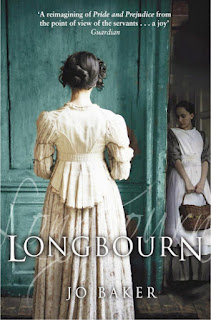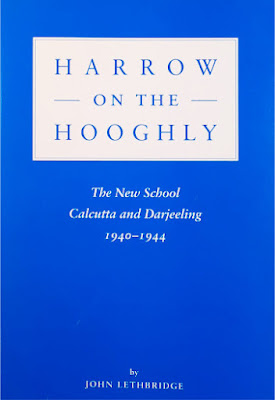Longbourn, by Jo Baker
Longbourn is home to the Bennet family. They are Mr and Mrs Bennet, with their five daughters, Jane, Elizabeth, Mary, Lydia and Kitty. If this sounds familiar, it's hardly surprising. However while Jo Baker's book Longbourn is set in the Bennet household which readers worldwide know and love from Jane Austen's most famous novel, it has as its focus a cast of characters who are usually only fleetingly seen in classic novels, the various servants who keep the household running.
There is quite a cottage industry - or should I say, stately home industry - devoted to spinoffs from Jane Austen's Pride and Prejudice. Many years ago I gave my Mum one of the better known examples, Pemberley by Emma Tennant. At that time I hadn't read any Jane Austen myself, but I knew she was a fan; as far as I remember she was non-commital about its worth. I've just had a quick check online and it does seem that the majority of these books are continuations of the story.
I confess I've only read Pride and Prejudice once, long enough ago to be a little unsure about certain comparisons. I will read it again some day; it'll be interesting to see whether I find it hard to appreciate the novel in the same way, after reading Longbourn. I gather that the events of the narrative match up well with those of the original. But the world of the servants, the downstairs world, is largely separate from that of the landowning classes, and most of the prominent characters of Austen's book are only occasionally glimpsed, and they barely interact with our foregrounded characters when they do. For instance, when the horrendous Lady Catherine de Burgh arrives at Longbourn in order to bully Elizabeth for her presumptousness, she sweeps right in without acknowledging the existence of the housemaid at all. As for the conversations between the finer folk, we mostly aren't privy to them, unless one of the lower orders presses an ear to a door.
The author Jo Baker has a clear agenda, in wanting us to think about this state of things. Most readers take it as read that for Jane Austen, these class divisions are the natural order of things. (Reading more deeply, Austen does seem to address some diverse thinking in typically subtle fashion, such as the matter of slavery, in Mansfield Park). I don't think Baker is seeking to undermine Jane Austen, so much as trying to make us understand the reality of the lives of all these underlings, that the whole grand social edifice depends on. There is some powerful writing throughout, vivid at the start as she describes how tough it had to be for the housemaids forced to give their hands such harsh treatment on washing day. The Bennet girls never appear to understand the physical grind forced on the servants in order to enable their endless social round.
Moreover, crucially for this story, they never seem to understand that the servants lead lives as social human beings as well. When near the end protagonist housemaid Sarah wishes to leave her employ at Pemberley (sorry, that's a minor spoiler), Elizabeth and Darcy find it incomprehensible. For a servant, no more congenial post could be found anywhere. But the events of Baker's story, largely taking place out of sight of their 'betters', have made the decision impossible to resist for Sarah. It's a scene I like very much. It's the first time we have properly seen Darcy, and while at first he stands right over Sarah in a fashion which he must have used time and again with servants, asserting his superiority, it's a test of Sarah's willingness to take charge of her life; she passes it, and he accepts it.
I'm less sure about the representation of Elizabeth, in that scene, and also several scenes beforehand. The Elizabeth of P & P is loved by readers for her empathy and wisdom, and strength of character (yes?); but here, with the servants, while never unkind, she does come across as blithely indifferent. Another (not-really-a)spoiler: Sarah has fallen in love with the new footman (barely mentioned in the original), but who has disappeared for reasons I'll leave alone. When she first tries to engage her superiors there's no interest and soon it's as if he was never there. Speaking to Elizabeth, she refers to him as "Mr Smith" and Elizabeth is baffled; enlightened, she responds with "Oh you mean Smith! The footman!" at which point her mind is soon on other things. I don't really know about this. It'll be one of the aspects of P & P I'll be most curious about, to judge whether Elizabeth could be quite as shallow as she is shown to be there.
Longbourn is full of elements which make one itch to read Pride and Prejudice again. Some readers will find it difficult to view the original in the same way again. I know that my attention will be focused on any appearance or simply any mention of the servants. Baker is obliged to invent some of them anyway, so they won't figure (like the highly entertaining Polly). But I'm full of praise for bringing them to life. I'm also greatly impressed with the writing, the rendering of the natural environment in and around the great houses. It's richly detailed at times, but never detached from the human experience of life in that world.
I've no idea what Mum would have thought of Longbourn. As you may have guessed from how I started this piece, I was resistant to yet another example of Austen follow-on fiction. But Longbourn is definitely its own book. I would think most readers will get wrapped up in the stories of Sarah and her fellow downstairs dwellers. The characters are all beautifully written. One or two may seem to display a very different side to them from that seen in P & P; but people can look different from different perspectives in real life, can't they? There's a film on the way; unusually, I'm really looking forward to it. Though it'll miss the warm experience of reading this book.




Comments
Post a Comment